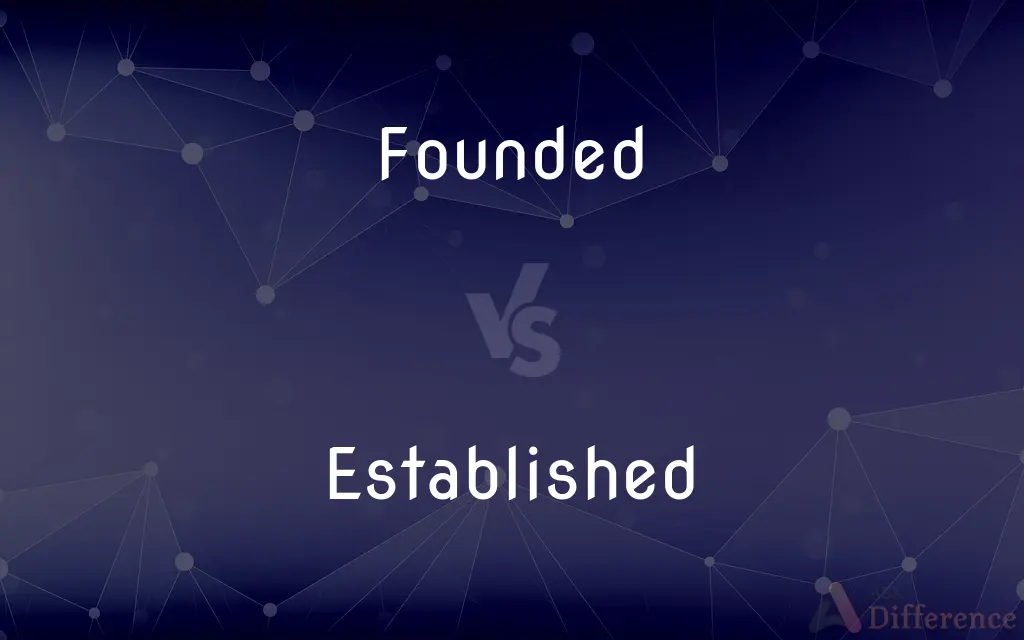Founded vs. Established — What's the Difference?
By Fiza Rafique & Maham Liaqat — Updated on March 6, 2024
Founded refers to the creation or origination of an institution, organization, or city, often emphasizing the initial idea or act of inception. Established suggests a more formal or official beginning, emphasizing stability and recognition.

Difference Between Founded and Established
Table of Contents
ADVERTISEMENT
Key Differences
When an organization, institution, or city is said to be "founded," the term often highlights the role of the founders and the initial idea or act that brought the entity into existence. This implies a focus on the conceptual or initial creation phase. On the other hand, when something is described as "established," it often connotes a sense of formalization or official beginning, suggesting not just the initial creation but also the attainment of a certain level of stability, recognition, or authority.
The use of "founded" tends to evoke the pioneering spirit of the founders, emphasizing the innovative or original aspect of the creation. It is particularly used when the identity of the founders or the creative process is an important part of the narrative. Whereas "established" often carries a connotation of enduring presence and legitimacy, implying that the entity has been recognized and has operated over a period of time to gain a certain status or credibility.
In historical contexts, "founded" is often used to denote the year or period when a city or institution was first created, highlighting its origins and the vision of its founders. "Established," however, may refer to a later point in time when the entity was officially recognized or when it achieved a significant milestone in its development, indicating a level of maturity or permanence.
In business, a startup might be said to have been "founded" by its entrepreneurs, focusing on the entrepreneurial vision and the act of starting the business. Conversely, "established" is often used to refer to businesses that have successfully navigated the initial startup phase and have achieved a stable position in the market, possibly expanding their initial scope or services.
While both terms can sometimes be used interchangeably, the choice between "founded" and "established" can subtly change the emphasis of the narrative, with "founded" focusing more on the origins and the act of creation, and "established" highlighting the process of gaining stability, recognition, or authority over time.
ADVERTISEMENT
Comparison Chart
Connotation
Emphasizes the act of creation or inception by founders.
Suggests formalization, stability, and recognition over time.
Focus
Initial idea, vision, and creation process.
Gaining legitimacy, stability, and a recognized status.
Usage Context
Often associated with the origins and identity of the founders.
More associated with the achievement of milestones and durability.
Historical Use
Refers to the original creation date of cities, institutions.
May indicate a later date of official recognition or significant achievement.
Business Implication
Highlights entrepreneurial vision and startup phase.
Indicates a transition to a stable, recognized, or expanded phase.
Compare with Definitions
Founded
Originating an idea or movement.
The environmental movement was founded on concerns for the planet's sustainability.
Established
Officially instituted or confirmed.
The national park was established to preserve natural habitats.
Founded
Establishing a new business or enterprise.
She founded her technology startup in 2010.
Established
Achieving a record of reliability or authority in a field.
He established himself as an expert in renewable energy solutions.
Founded
The act of starting a new organization or settlement.
Rome was founded according to legend by Romulus and Remus.
Established
Developing a significant customer base or market position.
The brand was established among consumers for its quality.
Founded
Creating a new product line or service.
The company was founded with the introduction of its innovative gardening tools.
Established
Gaining a permanent presence or operation.
The community center was established in the heart of the city.
Founded
Initiated or created by one or more individuals or entities.
Harvard University was founded in 1636 by the Massachusetts legislature.
Established
Achieved recognition and stability over time.
The firm was established as a leader in the industry by the 1980s.
Founded
To establish or set up, especially with provision for continuing existence
The college was founded in 1872.
Established
To cause (an institution, for example) to come into existence or begin operating; found; set up.
Founded
To establish the foundation or basis of; base
Found a theory on firm evidence.
Established
To bring about; generate or effect
Establish goodwill in the neighborhood.
Founded
To melt (metal) and pour into a mold.
Established
To place or settle in a secure position or condition
They established me in my own business.
Founded
To make (objects) by pouring molten material into a mold.
Established
To cause to become regular or usual
Established the habit of going to bed early.
Founded
Past tense and past participle of find.
Established
To cause to be able to grow or thrive
The tree needs to be watered to help it become established.
Founded
Simple past tense and past participle of found
Established
To cause to be recognized and accepted
A discovery that established his reputation.
Founded
Simple past tense and past participle of find|lang=en
Established
To introduce and put (a law, for example) into force.
Founded
To set up; to launch; to institute.
Established
To prove the validity or truth of
The defense attorneys established the innocence of the accused.
Founded
Having a basis.
She offered a well-founded hypothesis.
Established
To make a state institution of (a church).
Founded
Based; - often used as combining terms; as, well-founded suspicions.
Established
Simple past tense and past participle of establish
Founded
Having a basis; often used as combining terms;
A soundly based argument
Well-founded suspicions
Established
Having been in existence for a long time and therefore recognized and generally accepted.
Established
Of a religion, church etc.: formally recognized by a state as being official within that area.
Established
(Model, procedure, disease) Explicitly defined, described or recognized as a reference.
Established
Brought about or set up or accepted; especially long and widely accepted; as, distrust of established authority; a team established as a member of a major league; enjoyed his prestige as an established writer; an established precedent; the established Church. Contrasted with unestablished.
Established
Securely established; as, an established reputation.
Established
Settled securely and unconditionally.
Established
Conforming with accepted standards.
Established
Shown to be valid beyond a reasonable doubt; as, the established facts in the case.
Established
Introduced from another region and persisting without cultivation; - of plants.
Established
Brought about or set up or accepted; especially long established;
The established social order
Distrust the constituted authority
A team established as a member of a major league
Enjoyed his prestige as an established writer
An established precedent
The established Church
Established
Securely established;
An established reputation
Holds a firm position as the country's leading poet
Established
Settled securely and unconditionally;
That smoking causes health problems is an accomplished fact
Established
Shown to be valid beyond a reasonable doubt;
The established facts in the case
Established
Conforming with accepted standards;
A conventional view of the world
Established
Introduced from another region and persisting without cultivation
Common Curiosities
What does it mean when a company is founded?
It means the company was initiated or created by one or more individuals, marking the beginning of its existence based on an idea or vision.
How do investors view founded vs. established companies?
Investors might see "founded" companies as potentially higher risk but with high growth potential, while "established" companies might be viewed as lower risk due to their proven track record and stability.
Can a company be both founded and established in the same year?
Yes, a company can be founded and become established in the same year, especially if it quickly gains market recognition or achieves significant milestones shortly after its inception.
Is "founded" only used for organizations?
No, "founded" can also refer to the creation of cities, institutions, movements, and even the initiation of specific ideas or practices.
Why is the distinction between founded and established important?
The distinction highlights different phases in the life of an entity, from its initial creation and vision (founded) to its achievement of stability and recognition (established), offering insights into its development and status.
How does the public perception differ between a founded and an established entity?
Public perception of a founded entity may focus on its innovative or entrepreneurial spirit, while an established entity may be seen as reliable, experienced, and possibly more conservative.
Does "established" imply success?
While "established" suggests a level of stability and recognition, it does not necessarily guarantee ongoing success. It indicates that an entity has reached a significant milestone or level of maturity.
What does established mean in business?
In business, "established" indicates that the company has achieved a stable position in the market, recognized for its reliability, quality, or presence over time.
Is there a legal difference between being founded and established?
Legally, "founded" refers to the act of creation or inception, whereas "established" can imply a recognized legal status or the point at which the entity begins operating under certain regulatory standards or achieves specific legal recognitions.
Can an organization be re-founded?
An organization can undergo a significant transformation or rebranding that might be described as a "re-founding" if it marks a return to its original values or the start of a new direction, though this is less common.
What role do founders play in an established company?
Founders can play various roles in an established company, from continuing as key leaders or board members to serving as symbolic figures representing the company's origins and values.
Share Your Discovery

Previous Comparison
Stigmatism vs. Stigma
Next Comparison
Blacks vs. BlackyAuthor Spotlight
Written by
Fiza RafiqueFiza Rafique is a skilled content writer at AskDifference.com, where she meticulously refines and enhances written pieces. Drawing from her vast editorial expertise, Fiza ensures clarity, accuracy, and precision in every article. Passionate about language, she continually seeks to elevate the quality of content for readers worldwide.
Co-written by
Maham Liaqat















































